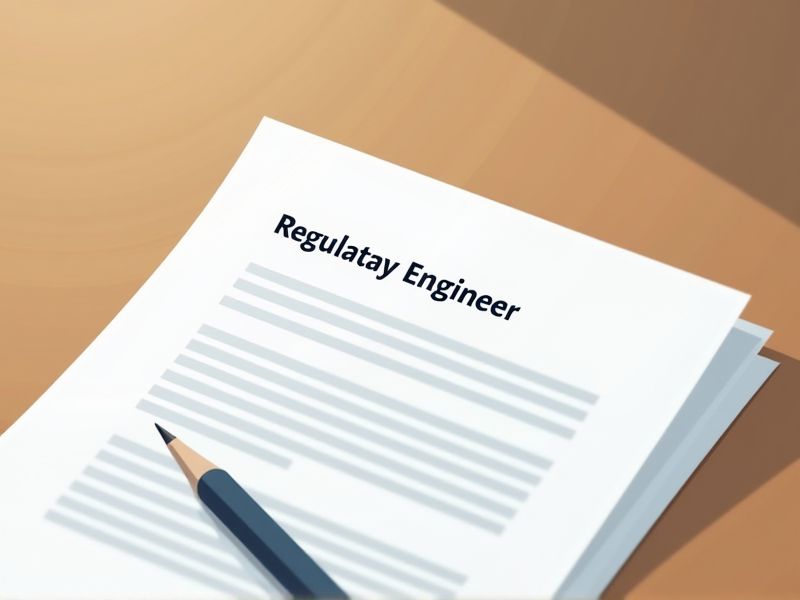
Regulatory Engineers ensure products comply with industry standards and government regulations, necessitating a deep understanding of compliance protocols. Certifications provide formal recognition of this expertise, showcasing their capability to navigate complex regulatory landscapes efficiently. Industry-specific certifications help streamline processes, minimize legal risks, and enhance the safety and reliability of products. Consider these important certifications you may need as a Regulatory Engineer.
Regulatory Affairs Certification (RAC)
Regulatory engineers often work in environments where compliance with industry regulations is crucial, and the Regulatory Affairs Certification (RAC) validates their understanding of these complex requirements. Without RAC, engineers might lack recognized credentials, potentially leading to inefficiencies in navigating regulatory pathways. Holding an RAC can enhance job prospects by providing a competitive edge in the regulatory sector. Companies may prefer certified professionals to minimize the risk of non-compliance, which can lead to costly fines or recalls.
ISO 13485 Lead Auditor Certification
ISO 13485 Lead Auditor Certification is important for a Regulatory Engineer because it equips them with the necessary skills to assess and verify the quality management systems in medical device manufacturing, ensuring compliance with international standards. This certification enhances their ability to identify potential gaps and risks, effectively facilitating continuous improvement within the organization. With the knowledge acquired, a regulatory engineer can better advise on strategies to meet regulatory requirements across different markets, minimizing the likelihood of non-compliance issues that could result in costly recalls or penalties. Certified auditors are also more credible in stakeholder communications, reinforcing trust in the company's commitment to product safety and quality.
ISO 9001 Lead Auditor Certification
Obtaining the ISO 9001 Lead Auditor Certification equips a Regulatory Engineer with the skills to effectively audit quality management systems, ensuring compliance with international standards. This certification often leads to enhanced credibility and trust with stakeholders, including regulatory bodies and clients. Proficiency in ISO 9001 also enables a Regulatory Engineer to identify potential areas of improvement within an organization's processes. Consequently, it can foster a culture of continuous improvement, aligning with regulatory requirements and business goals.
Good Manufacturing Practices (GMP) Certification
Good Manufacturing Practices (GMP) Certification ensures a Regulatory Engineer stays updated with essential quality standards in production processes. This certification helps in identifying and mitigating compliance issues, reducing the risk of product recalls. It establishes credibility and trust with stakeholders, which is crucial for regulatory compliance in industries. Without it, engineers may lack crucial knowledge to guide safe and effective product development.
Certified Quality Engineer (CQE)
A Certified Quality Engineer (CQE) is essential for a Regulatory Engineer because they ensure products meet stringent quality standards, which is crucial for regulatory compliance. Their expertise helps identify potential flaws early in the development process, reducing the risk of non-compliance issues. They provide valuable insights into process improvements that align with regulatory demands. Their quality assessment skills contribute to a more efficient and compliant engineering process overall.
Project Management Professional (PMP)
The Project Management Professional (PMP) certification equips a regulatory engineer with essential project management skills, enhancing their capability to oversee complex engineering projects while adhering to industry standards. This certification signifies proficiency in managing budgets, timelines, and resources, minimizing the risk of non-compliance due to poor project execution. The structured methodologies learned through PMP help regulatory engineers to better coordinate cross-functional teams, ensuring regulations are met efficiently and effectively. In competitive markets, possessing a PMP can distinguish a regulatory engineer, reflecting their commitment to maintaining rigorous project and regulatory standards.
Six Sigma Green Belt Certification
The Six Sigma Green Belt Certification equips regulatory engineers with essential skills in process optimization, leading to enhanced compliance in regulatory environments. Mastering Six Sigma methodologies allows engineers to identify and reduce variations, effectively managing risks that align with stringent regulatory standards. The certification fosters a robust framework for continuous improvement, ensuring products and processes meet legal requirements while reducing inefficiencies. Data-driven decision-making, a core aspect of Six Sigma, empowers engineers to leverage statistical analysis for improved regulatory reporting and audits.
FDA Medical Device Regulatory Certification
The FDA Medical Device Regulatory Certification ensures a Regulatory Engineer's understanding of compliance with U.S. medical device laws and standards. Companies require this certification for engineers to navigate the complex regulatory environment, ensuring product safety and efficacy. Achieving certification also demonstrates a commitment to maintaining public health standards, thereby building trust with consumers and stakeholders. Without certification, engineers risk non-compliance, which can lead to legal challenges and financial losses for their organizations.
Environmental Health and Safety (EHS) Certification
Environmental Health and Safety (EHS) Certification is critical for regulatory engineers to ensure compliance with governmental and industry standards. EHS-certified engineers can better identify and mitigate potential hazards, leading to safer work environments. With EHS certification, they gain the knowledge to effectively navigate and implement policies that reduce the risk of accidents and legal liabilities. This certification enhances their ability to contribute to sustainable industrial practices by integrating environmental considerations into engineering decisions.
PMI Risk Management Professional (PMI-RMP)
Regulatory Engineers often work in environments with stringent compliance requirements, and PMI-RMP provides a structured approach to identifying and mitigating risks, ensuring adherence to regulations. Achieving the PMI-RMP certification equips engineers with advanced skills in risk assessment, which helps preempt potential compliance issues that could lead to project delays or legal consequences. The certification emphasizes strategic risk management, directly impacting the ability of regulatory engineers to efficiently manage and mitigate risks associated with regulatory standards. As projects become increasingly complex, employing PMI-RMP methodologies enhances a regulatory engineer's capability to maintain project integrity and uphold regulatory commitments.
Summary
When you earn certifications as a Regulatory Engineer, your expertise and credibility in the field increase significantly. This enhancement often leads to better job prospects and higher earning potential due to the recognized validation of your skills. Your ability to navigate complex regulatory requirements impresses employers and clients, making you a more competitive candidate. These certifications can also expand your professional network, providing opportunities for collaboration and career advancement.
